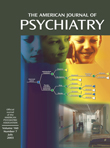Familial Aggregation of Delusional Proneness in Schizophrenia and Bipolar Pedigrees
Abstract
OBJECTIVE: Clinical, familial, and, more recently, genetic linkage studies suggest that overlapping genetic susceptibility might contribute to both schizophrenia and bipolar disorder. To identify a potential psychotic dimension common to families of both bipolar and schizophrenia probands, the authors tested if delusional proneness was observed among first-degree relatives of bipolar and schizophrenia probands. METHOD: The authors included 32 schizophrenia probands and 61 bipolar probands and their respective first-degree relatives (N=63 and N=59). They were all interviewed with the Diagnostic Interview for Genetic Studies, and delusional proneness was assessed with a self-report questionnaire, the Peters et al. Delusions Inventory. Schizophrenia and bipolar probands were subdivided into subgroups according to the intensity of delusional symptoms assessed by Peters et al. Delusions Inventory scores, and the authors compared delusional proneness in their respective first-degree relatives. RESULTS: Familial aggregation of delusional proneness was demonstrated, since Peters et al. Delusions Inventory scores were higher among nonschizophrenic first-degree relatives of schizophrenia probands with productive symptoms and among first-degree relatives of bipolar probands with psychotic features during their affective episodes. The authors also found an intrafamilial correlation of delusional proneness scores in nonaffected siblings of schizophrenia and bipolar probands. CONCLUSIONS: Delusional proneness appears to be an inherited predisposition common to both schizophrenia and bipolar disorder. In the future, this dimension might be valuable when used as a quantitative phenotype in linkage and association studies.



